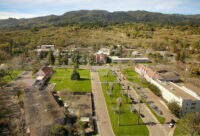It seems like everyone is invoking “community” nowadays. Government speaks of “engaging the community,” developers and nonprofits talk about “community outreach,. We hear about things like the “community pool” and even our Sonoma Valley Sun tag line includes the word “community.” This prompts the question: what is meant by “community”?
Like many other words commonly in use, such as “sustainable,” “natural” or “green,” the word “community” is used so frequently that it’s become nearly impossible to pin down what’s intended. It can be used as a simple descriptive term about geography, or a cultural identifier; or instead as an emotional term implying affinity. Fact is, “community” can be meant in a variety of ways.
The difficulty arises when its meaning is unclear, and when that is the case the only real way to determine why it’s been used rests in determining intent. Too often the intent is to draw upon its positive emotional resonance to manipulate public opinion in either a positive or negative direction.
In one way or another each of us is a member of community, perhaps more than one. If a Pétanque player, one is member of the Pétanque community. If a lover of books, then one is a member of the book-reading community. This extends to clubs, groups and organizations. Those who live in Sonoma Valley are also members of the Sonoma Valley community, but beyond a physical presence, does it mean anything?
Within the Sonoma Valley community are various geographic, economic and cultural sectors. Thus a Springs’ resident is part of the Sonoma Valley community and the Springs community, and perhaps even the Sonoma County community. And a further distinction, for example, can be made between Latino and non-Latino members of the Springs community.
Fact is, unless qualifiers are added, the word “community” is in itself so broad as to be nearly meaningless. It is within such vague parameters that the manipulation often takes place.
As a catch-all phrase, “community” is often tossed around casually, as if its mere mention confers a form of legitimacy or consensus. When a developer talks about having received “input from the community” it’s often a way of simply deflecting criticism or concern. Nonprofits are quick to affirm that they serve “the community.” This is not to say that every time community is invoked it’s an exercise in phony-baloney, but unless the nature of “the community” is well-defined and explained, it means little. How many people, after all, comprise a “community”? Ten, twenty, over fifty, one hundred? And who are these people; how old, what race, weekenders?
We suggest that precision matters, particularly when important decisions are made. Invoking “community” without adequately explaining, to whom and in what ways it applies is not sufficient. The public deserves better than that. Unless government, developers and any organization with an agenda begin to use the word “community” in a careful and well-defined manner, people will become numb to or worse, cynical about the term. “Community,” we’re sad to say, is in danger of becoming a cliché.
Sun Editorial Board





Be First to Comment